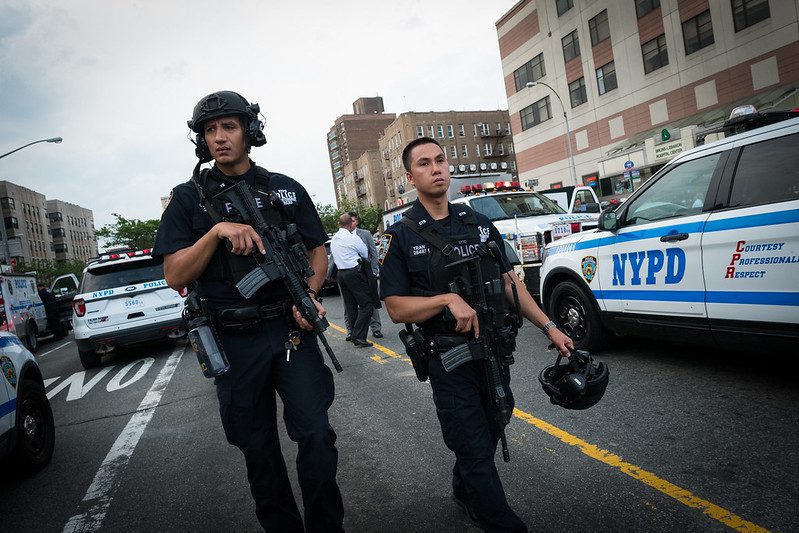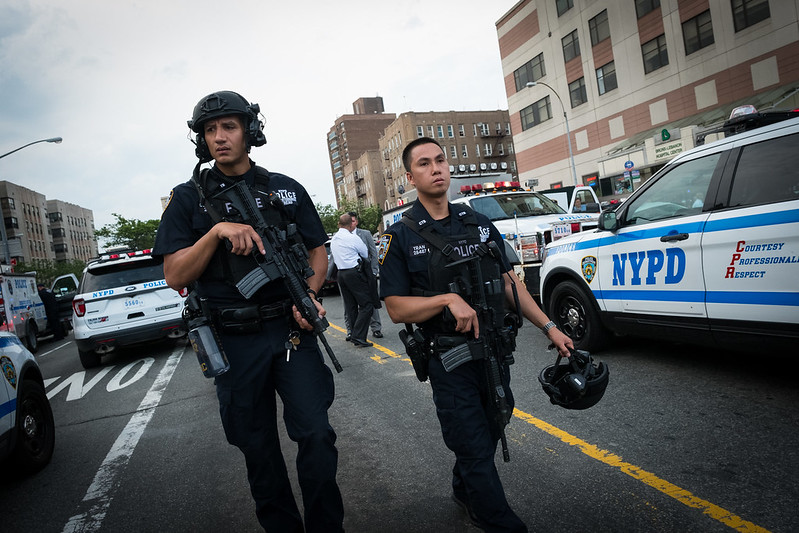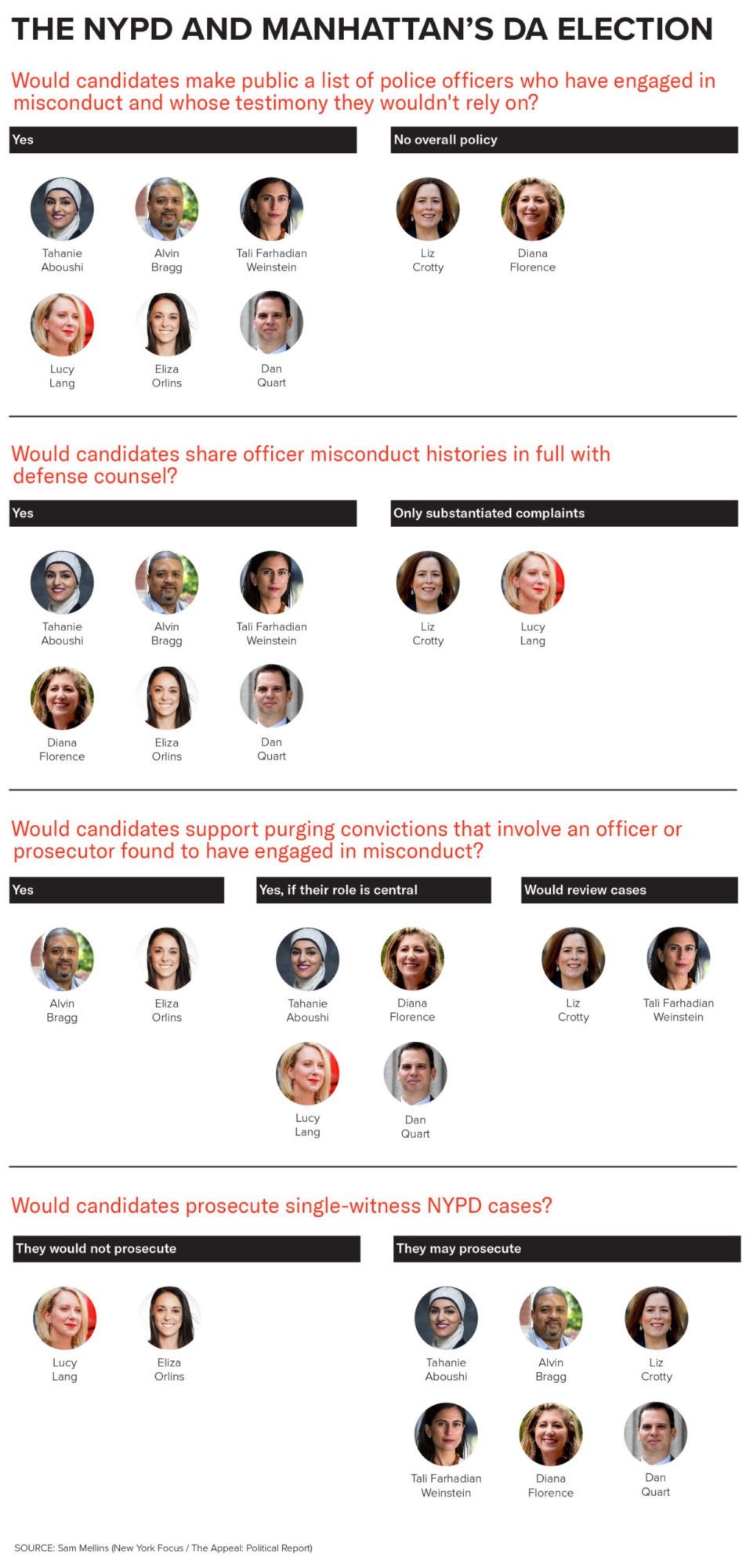On NYPD Oversight, Manhattan’s D.A. Candidates Are Split
Candidates running in Tuesday’s election vow to sideline untrustworthy officers and purge past convictions. The outgoing DA has drawn fire for his handling of police misconduct.
Sam Mellins | June 17, 2021


This article originally appeared on The Appeal, which hosted The Political Report project.
Candidates running in Tuesday’s election vow to sideline untrustworthy officers and purge past convictions. The outgoing DA has drawn fire for his handling of police misconduct.
This article is published as part of a partnership between New York Focus and The Appeal: Political Report to cover the policy contrasts in Manhattan’s 2021 DA election. Our first articles address the war on drugs, statewide advocacy, life sentences, and sex work.
In the wake of worldwide protests against police brutality sparked by the murder of George Floyd, New York State and the city took steps last spring toward promoting police accountability, passing legislation to make many misconduct records publicly available and to ban the use of chokeholds.
“You don’t need to protest, you won,” Governor Andrew Cuomo said, addressing protesters after a package of reforms passed the legislature. “You accomplished your goal. Society says you’re right: The police need systemic reform.”
But New York activists say the effect of legislative reforms has been severely blunted by accounting tricks and continued police resistance to transparency. Many advocates view next Tuesday’s primary election for district attorney in Manhattan as their next best opportunity to promote police accountability.
“The police can only go as far as the DA lets them,” Rigodis Appling, a criminal defense attorney and member of the Black Attorneys of Legal Aid caucus, told New York Focus and The Appeal: Political Report. “Prosecutors can reform police.”
Prosecutors across the state have not done enough to rein in police abuses, advocates say. These arguments played out in DA elections elsewhere in New York last year and contributed to the ouster of the Westchester County DA amid a whistleblower scandal about a police cover-up. In New York City this year, they take on particular resonance given the revelations about former police officer Joseph Franco, who is alleged to have framed over 100 defendants with false testimony.
Departing Manhattan District Attorney Cyrus Vance has faced criticism for a perceived lack of dedication to police accountability, including his choice to prosecute protesters arrested by the NYPD last spring.
Reform advocates have faulted Vance in particular for continuing to rely on police officers with a history of misconduct, for prosecuting cases where the sole witness is an officer, and for not doing enough to review past cases that involved tainted officers. Vance has purged some convictions due to officer misconduct, but advocates have called for his office to be more proactive in seeking out instances of wrongdoing and to move more quickly in purging.
On all those fronts, many of the eight candidates in the Democratic primary for DA—all of whom spoke to New York Focus and The Appeal for this article—are vowing change. They say they would take steps to increase consequences for police who engage in misconduct and to treat police testimony with more skepticism.
For instance, two candidates said they would not prosecute cases in which the only witness is a police officer. Six said they would publicly release a list of police officers judged to be untrustworthy whose testimony they would not use in court.
But two candidates—Diana Florence, a former prosecutor at the Manhattan DA’s office, and Liz Crotty, also a former prosecutor who has been endorsed by several major law enforcement unions—committed to few or none of the policy changes that New York Focus and the Political Report asked about.
And other differences also emerged between the more progressive candidates, some of whom qualified their positions or made exceptions to their commitments.
Untrustworthy officers
Getting prosecutors to stop relying on the word of untrustworthy police officers is one effective way to sideline them, advocates say. They want the next Manhattan DA will emulate Brooklyn and Staten Island in creating a “do-not-call” list of officers whose testimony they will not use. They also hope that the list will be shared with the public, unlike Brooklyn and Staten Island’s.
According to news reports, the Manhattan DA maintains a list of untrustworthy police officers, but being on the list does not disqualify an officer’s testimony from testifying in court, and the list is not public.
Six of the eight candidates—all except Florence and Crotty—said that they would change this policy: They would set up a list of officers whom they view as disqualified from testifying, and they would publicize the list.
Candidates cited behaviors such as lying in court or falsifying records as actions that would lead officers to be placed on the list. Some candidates’ platforms describe criteria in more detail.
Alvin Bragg said his office would be proactive in identifying officers to be placed on the list. “The range of misconduct to which prosecutors have unique access is virtually unlimited,” he said, noting prosecutors’ review of evidence as a context in which police misconduct can come to light. “Police misconduct takes many forms that do not appear in disciplinary records.”
Such a policy would be a significant departure from the current status quo, where, Appling said, “everyone knows [police officers] can do whatever they want, they can say whatever they want, whatever they say about you is going to be believed in court.”
The two candidates who did not endorse a public “do not call” list remained noncommittal. Florence referred to her proposal to have the City Council create a public database of officer misconduct.
Last June, the New York legislature repealed 50-a, a law that had shielded police misconduct records from public scrutiny for decades. Dan Quart, a member of the New York State Assembly, voted for the repeal in the legislature, while Bragg worked in support of the repeal from his position as deputy attorney general of New York. Other candidates also supported the repeal of 50-a. In March, after lengthy legal proceedings, thousands of disciplinary records of NYPD officers became public.
But police reform advocates criticized the partial nature of the repeal, noting that misconduct cases that did not result in a finding or admission of guilt on the part of the officer were not made public.
In interviews with New York Focus and the Political Report, criminal justice advocates also called for the next DA to adopt greater transparency during trials when dealing with officers who have previously been accused of misconduct such as brutality or sexual harassment.
One reform they say would carry particular weight would be sharing police officer misconduct histories with defense counsel in full, something that advocates and public defenders said the Manhattan DA’s office has tended not to do.
“The DA’s office has access to records [on police misconduct]. But what they’re doing is only giving [defense] attorneys these very basic and narrow summaries,” said Jennvine Wong, an attorney with the Legal Aid Society’s Cop Accountability Project.
“They could interpret their duty to disclose in a much broader manner, and give us the entire misconduct history that they have access to. But they’re not. You have to ask, ‘Why are you not doing that? Are you protecting these cops?’” Wong added.
Six candidates—Bragg, Florence, Quart, Tahanie Aboushi, Tali Farhadian Weinstein, and Eliza Orlins—said they would share the records of an officer’s misconduct with defense counsel in full, including all registered complaints regardless of whether they had been substantiated. Aboushi noted that disclosing “all evidence” would be her “default.”
Crotty and Lucy Lang said they would not share unsubstantiated complaints.
Purging tainted convictions
In April this year, Vance and Brooklyn DA Eric Gonzalez announced that they were moving to dismiss nearly 200 cases involving former NYPD detective Joseph Franco because of his 2019 indictment on charges of perjury and other official misconduct.
Several criminal defense and criminal justice organizations, including the Legal Aid Society and the Innocence Project, called on the city’s DAs to go further; the groups identified 22 NYPD officers as having been convicted of crimes or of serious misconduct, and called on DAs to vacate all convictions in which these officers played an “essential role.” Six of the Manhattan DA candidates—all except Farhadian Weinstein and Crotty—signed a letter making this demand in May.
When New York Focus and the Political Report asked the candidates about their positions, two of them—Bragg and Orlins—went beyond the demands of the letter.
“If an officer who was known to have been a liar was part of the way in which that person was convicted, that case will be purged. Not a new trial,” Orlins said. Bragg also said he would purge convictions without making his answer contingent on the scope of the role played by the compromised officers or prosecutors.
Four candidates staked out somewhat more limited positions on purges of tainted convictions.
Aboushi, Lang, and Quart all used the language of the May letter, promising to vacate convictions in all cases in which tainted prosecutors or police officers had played an “essential role.” They also promised an investigation in cases where tainted officers played a lesser role. Aboushi went one step further when it comes to prosecutorial misconduct, as opposed to police misconduct, promising to drop charges or motions for a retrial in any such case.
Florence laid out a weaker position than the one she endorsed in the letter. She said she would support purging convictions in cases which relied “solely” on the credibility of a tainted police officer, and in cases where a prosecutor’s misconduct was found to be “intentional.”
Farhadian Weinstein and Crotty, the two candidates who didn’t endorse the letter, did not commit to purging any convictions. Farhadian Weinstein offered that she would set up a “presumption of vacatur for convictions” where “egregious acts” played an “essential role.”
During her tenure at the Brooklyn DA’s office from 2018 to 2020, Farhadian Weinstein was involved in the leadership of a unit that worked on exonerating wrongfully convicted individuals. The unit’s exoneration rate was fewer than two per year, a significant drop from the rate in the years before Farhadian Weinstein’s tenure, New York Focus and The Appeal reported last month.
Ending single-witness NYPD prosecutions
Ending prosecution of single-witness NYPD cases is a priority of some criminal defense attorneys, who say that such prosecutions accentuate racial biases in policing and enable abusive practices such as “buy and bust” stings, in which police officers pose as drug-dependent individuals or drug dealers in order to persuade someone to make an illegal drug sale.
“District attorneys should not prosecute those cases,” Appling said of single-witness officer prosecutions. “[Police] arrest based on bias. The DA can stop those biased arrests by not prosecuting police-only complaints. It would be a step towards racial justice.”
Two candidates—Orlins and Lang—said they would not prosecute cases in which the only witness was an NYPD officer.
Aboushi said that such cases would be “exceedingly rare,” though she did not rule them out, and that the officer’s testimony would be “subjected to rigorous scrutiny.”
Farhadian Weinstein and Crotty also said they would continue to prosecute such cases. Florence said the issue of credibility would be ameliorated by the widespread adoption of officer-worn body cameras, but she did not address the question directly.
Whatever policy changes the next DA chooses to implement to promote greater police accountability, the true test of commitment to reform will be whether they enforce and stick to them in the face of likely opposition, said Zamir Ben-Dan, a staff attorney at the Legal Aid Society.
“One of the things I’ve seen is that you have so-called progressive prosecutors talk nicely, but their line assistant district attorneys don’t get the message, so you have line ADAs who nonetheless believe whatever a cop tells them,” Ben-Dan said. “As long as there are people who do that, there isn’t going to be change in the DAs office, no matter how much the head professes to be about change.”
“There needs to be a change within the entire culture of the office where it’s made crystal clear that we do not take the word of police officers as gospel.”




